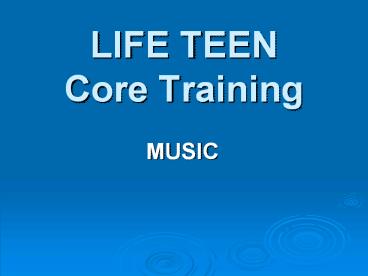LIFE TEEN Core Training PowerPoint PPT Presentation
1 / 17
Title: LIFE TEEN Core Training
1
LIFE TEEN Core Training
- MUSIC
2
Brief History
- Music in the Mass has had a long and rich
tradition. - We have manuscripts and historical accounts of
music reaching as far back as 500AD in the times
of Pope Gregory and Gregorian chant, whereby
music was composed for prayer and as a way of
elevating those prayers to a higher
consciousness. - Sacred music was written by composers such as
Palestrina and J.S.Bach and by various other
composers who wrote specifically for Masses.
3
Brief History
- The composition of sacred music or liturgical
music has continued through to today. We know of
songs such as One Bread, One Body and Here I
Am, Lord. We can sing along to the latest Matt
Maher or Tom Booth song. - We become part of the tradition that is our
liturgy, our Mass. - We make links with what has come before us, and
we live out our liturgy to make the future.
4
So
- The music is the soundtrack for the Mass.
5
Why sing in the first place?
- St Augustine those who sing, pray twice
- Mary Beth Knude-Anderson, diocesan director of
worship for Chicago "I think it is time to bid
farewell to the stigma that the Catholic Church
in town is the one where nobody sings!...we don't
merely sing at the liturgy, but we actually sing
the liturgy.... Singing the liturgy is what
people need to be doing...."
6
Why sing in the first place?
- "The musical tradition of the universal Church is
a treasure of immeasurable value, greater even
than that of any other art. The main reason for
this pre-eminence is that, as sacred melody
united to words, it forms a necessary or integral
part of the solemn liturgy." (Constitution on the
Sacred Liturgy, No. 112)
7
Why sing in the first place?
- Well, how bout you tell me
8
Why sing in the first place?
- Thoughts from Paul Innwood (1995) (We Shall Draw
Water Joyfully) - Singing "heightens the meaning of the text."
- Singing uplifts "special moments" of the liturgy,
like the Triduum blessings of fire and water.
9
Why sing in the first place?
- Singing and music slow us down and make us take
our time at Mass. Slower music "can give the
assembly space to pray, especially if there is an
instrumental pause." - Singing hymns "opens us up, makes us vulnerable,
allows God to speak to us." - Singing hymns also provides a means of identity
for the local church, the parish. It bonds the
community together. (A parish can be greatly
strengthened, Inwood has found, by having a hymn
that is like a "theme song" for that community.)
10
Why sing in the first place?
- Singing "creates a mood," and designs an
environment that encourages our communal and
personal response to God's Word. - Even more important, singing instructs the
assembly in a way of prayer. Singing hymns moves
us and leads us to places of spiritual
attentiveness and sensitivity that the spoken
word cannot. - http//www.americancatholic.org/Messenger/May1996
/feature2.asp
11
Why sing in the first place?
- Singing is
- Full Conscious Active Participation
12
What is good liturgical music?
- Good liturgical music
- is prayer.
- is grounded in scripture.
- is musically relevant, for example, choice of
instruments and styles. - is played by competent, quality, God-centred
musicians and singerswho rehearse.
13
What is good liturgical music?
- Good liturgical music
- works in the flow of the liturgy itself and is
mindful of the nuances that the Mass contains. - is singable. It has to be in a key in which all
can sing easily. Melodically, it needs to be
simple and repetitive. Dont forget to transpose
all relevant instrumental parts (or hit the
transpose buttons!)
14
What musicians and singers need to know.
- The musicians and singers are servants. Their
role is to elevate the congregation, to support
and lead them in prayer and song. - Ego does not have a place in music ministry!
- Musicians and singers are (obviously) visible and
are heard. A God-centred life, a life built on
our faith and teachings of Jesus Christ must go
hand-in-hand with music ministry.
15
What musicians and singers need to know.
- "Let the word of Christ richly dwell within you,
with all wisdom teaching and admonishing one
another with psalms and hymns and spiritual
songs, singing with thankfulness in your hearts
to God. And whatever you do in word or deed, do
all in the name of the Lord Jesus, giving thanks
through Him to God the Father." - (Colossians 316,17).
16
What musicians and singers need to know.
- St Augustine. Sermon 34, 6
- "You ask what you should sing about the one you
love? For of course you do want to sing about the
one you love. You are asking for praises of his
to sing. You have been told, Sing to the Lord a
new song. You are looking for praise songs, are
you? His praise is in the Church of the saints.
The praise of the one to be sung about is the
singer himself. Do you want to sing God his
praises? Be yourselves what you sing. You are his
praise if you lead good lives."
17
So nowits your turn
- You are to program music for a Mass.
- Read through the scriptures
- Choose appropriate songs for the following
- Entrance
- Offertory
- Communion
- Recessional
- Consider the flow of liturgy
- Be prepared to justify your choice of music

